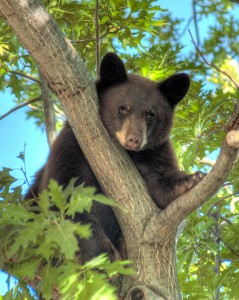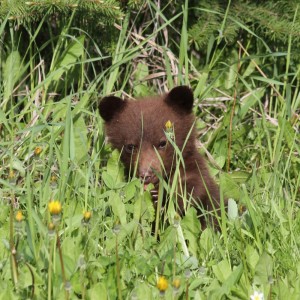We have much more to do and your continued support is needed now more than ever.
145 Black Bears Shot In Canada’s Tar Sands Region, More Deaths Likely
Environmental practices are so poor in Alberta, Canada, where the dirty fuel known as “tar sands” are being mined, that wildlife officials have been shooting bears that wander too close to the extraction area. Just recently, we reported to you that potentially thousands of wolves are destined for a similar fate in the region. NWF scientists say the wildlife killing is avoidable, but the Canadian oil industry and government are putting profits ahead of sound ecosystem management. From the Calgary Herald:
Alberta Sustainable Resource Development says 145 black bears were killed by Fish and Wildlife conservation officers last year after being habituated to garbage in the oilsands region. The number of bears shot in the Fort McMurray district was nearly three times the count the previous year and the highest in recent history, said spokesman Darcy Whiteside. Nearly half — 68 bears — were shot in oilsands camps and facilities after being attracted to the camp by food, garbage or other attractants, Whiteside said Tuesday.

Fort McMurray, like other company towns that have sprung up over the last few decades, sits in the middle of Canada’s boreal forest, one of the last great intact ecosystems in the world. But unchecked industrial development is leaving scars upon the earth that are visible from space (seriously – take a look at satellite pictures on Google Maps and prepare to be blown away) and destroying habitat that supports caribou, millions of migratory birds, and other species like lynx, gray wolves and bears.
Is Wildlife an Afterthought?
According to NWF scientist Dr. Doug Inkley, the provincial government’s actions are deplorable:
Their approach seems to be, if it becomes a problem, kill it — rather than prevent the problem in the first place. Humans are destroying bear habitat and not disposing of garbage properly. So, we kill the bears.
Whiteside, the spokesman for Alberta Sustainable Resources Development, stressed that bears aren’t endangered and the shootings have had “no impact on the black bear population as a whole.” But Dr. Inkley sees it another way. “This is death by a thousand cuts,” he says, his voice edged with anger. “It may seem like there are plenty of black bears now, but look what’s happening: the tar sands area that could be developed is the size of Florida, and this is going to be repeated over and over and over if we keep encroaching on their habitat.”
Making the Right Choice for Bears
David Mizejewski, a naturalist with National Wildlife Federation, says it comes down to common sense.
We make the choice about whether these bears are a problem or not. We’ve chosen to destroy their habitat and turn it into a garbage dump. We can make smarter choices and avoid conflicts with bears.
It may sound simplistic, but that’s what has happened in Alberta. Black bears aren’t naturally inclined to linger in places where people are, but if they learn that food is accessible they lose their fear quickly. Without proper waste management, bears and other animals become urban scavengers, attracted to the easy pickings from uncovered dumpsters. NWF’s Mizejewski points out that solutions like bear-proof trash cans can help lessen the problem, but the only long-term answer is to put the lid on tar sands development and prevent outright destruction of their habitat.
These animals don’t have to die. They’re being slaughtered in part due to America’s addiction to dirty oil.

![]() We need your help to protect wildlife! Get involved and help us stop this from happening. Take action to protect black bears and other wildlife caught in the line of fire.
We need your help to protect wildlife! Get involved and help us stop this from happening. Take action to protect black bears and other wildlife caught in the line of fire.
You can also help fight tar sands by making a donation. Visit NWF’s “Choose Your Cause” page to see how your support can safeguard black bears and other wildlife in jeopardy.





















